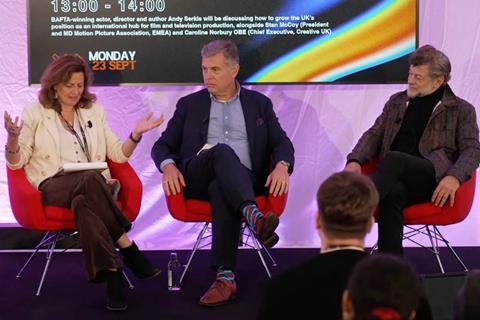
UK filmmaker and actor Andy Serkis told the Labour party conference that the UK screen industries need to embrace AI, and “get over” the fears around it overriding creatives.
“It’s about information and understanding of what AI is and the usage can be – people tend to lump everything together in generative AI,” said Serkis, who was speaking today (September 23) in Liverpool as part of the conference’s Cultural and Creative Industries Pavilion. The pavilion is a first-of-its-kind partnership at the conference between 40 creative organisations.
He added that AI has been “used for years in the film industry”. He acknowledged there were challenges in making sure artists are fairly renumerated for their work as AI develops, but rather than ignoring the technology, “We have to be the ones to write the rule book.”
Serkis suggested “disinformation” had scared people off AI. “We have to get over the fear that’s generated, and start to say to people there is this set of tools at our disposal… It’s another form of magic that I think is frightening people. If you dissociate from it, it’s always going to be a threat.”
He was speaking alongside Stan McCoy, president and managing director of the Europe, Middle East and Africa arm at US studios’ trade group the Motion Picture Association. McCoy echoed Serkis’ statements, pointing towards historic developments in digital film editing as initially being feared, but helping to create more work for editors, with producers and directors empowered to ask for an increased volume of re-edits, rather than eliminating jobs.
“I think it [AI] will be a driver of job growth in the industry,” he said.
Caroline Norbury, chief executive of Creative UK and the host for the discussion, added that under the former Conservative government, the creative industries felt shut out of the conversation about how AI should be implemented and regulated in the UK, but wants the creative industries to be part of a “grown-up, nuanced” conversation with government and decision-makers on its use.
Serkis, who played computer-generated Gollum in The Lord Of The Rings and The Hobbit films and has his own production company The Imaginarium, also advocated for more action to keep post-production and VFX work in the UK.
The sector received a boost under the previous Conservative government’s March budget, with the announcement that UK VFX costs on film and high-end TV productions will receive a 5% increase in tax relief within the UK’s new Audio Visual Expenditure Credit (AVEC), for an overall net rate of 29.25%. The government also removed the 80% cap on qualifying expenditure for UK VFX costs, from April 1, 2025. Under these plans, generative AI will not qualify for the additional tax relief for visual effects, which has been decried by the industry.
Elsewhere, the trio discussed the need for reformation of the apprenticeship levy, which has been deemed across all corners of the film and TV industries as not fit for purpose.
Launched in April 2017, the apprenticeship levy requires companies to invest 0.5% of their annual pay bill towards apprenticeships and offer a participant a contract of at least 12 months.
Training programmes have been criticised for not being flexible enough, with administrative costs surrounding the apprenticeships proving a burden for employers.
McCoy acknowledged that while pilot projects have had some success at a smaller scale, there needs to be a single entity “bringing diverse young people into the industry and having the foresight to know what are the skillsets we’re going to need – re-imagining ScreenSkills as a hub for figuring out what job priorities [there] are, making sure we have someone in the system who can direct the traffic for the places they [apprenticeships] are needed most in the industry, so it doesn’t work as a tax in the industry”.
Serkis added that, although his production company The Imaginarium had partnered up with Coventry University on a training scheme, “Companies like ours need support from government for apprenticeships – we need structure.”















![[L-R]: Amanda Villavieja, Laia Casanovas, Yasmina Praderas](https://d1nslcd7m2225b.cloudfront.net/Pictures/274x183/6/4/1/1471641_pxl_20251224_103354743_618426_crop.jpg)









No comments yet